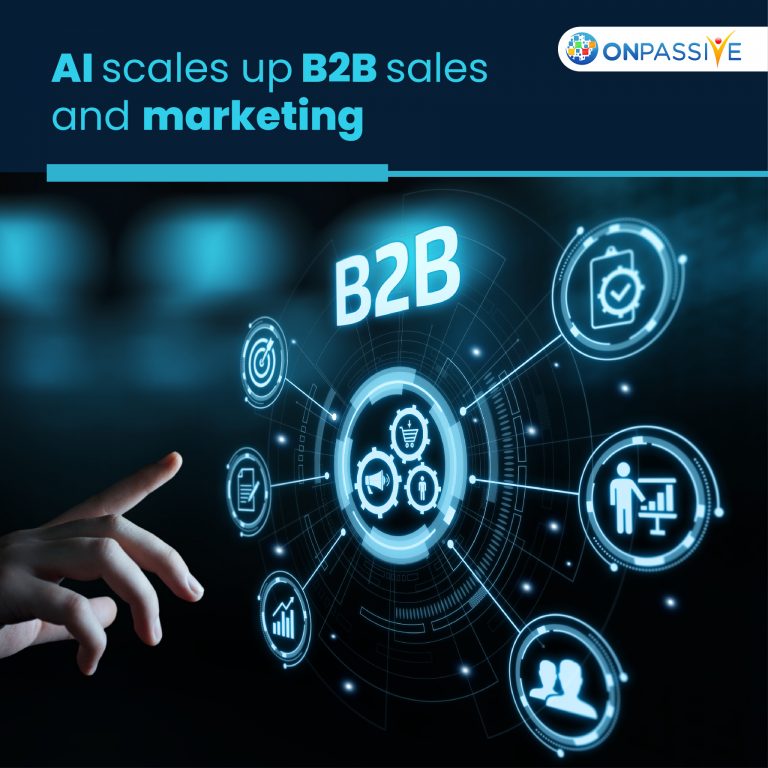
Artificial intelligence is on the verge of becoming the next big thing in digital transformation. For every company leader, the moment has arrived to investigate AI implementation. Most businesses should make establishing an AI strategy a high priority right now. This tendency is not limited to the B2B industry. AI is also making inroads into the B2B sector.
According to 80 per cent of B2B marketing professionals, adopting artificial intelligence has changed the business. As AI becomes more ubiquitous in the industry, it’s critical to understand how it will affect everything from corporate strategy to operations to customer service.
Why Is Adopting Artificial Intelligence Important For B2B Industry?
B2B customers have a far longer and more complicated purchase cycle than B2C customers. To meet each client’s needs, B2B firms must focus their efforts on understanding the buyer persona.
Whether it’s end consumers or corporate clients, each person leaves a trail of data in their online actions. Whether they search online, browse websites, or make purchases online, a huge amount of data must be evaluated to understand the user’s thinking, demographics, and behaviour.
As per research, 57% of business customers would expect firms to anticipate their requirements, and if they don’t, they will switch brands without hesitation. Businesses frequently lose critical insight when spending manual efforts in understanding the buyer since data obtained might be incorrect, mishandled, or considered redundant, leading to a loss of revenue and customer experience.
B2B marketers, as a result, require a precise strategy for data analysis. Every B2B marketer should use AI as an example of a tactical strategy. It aids in the evaluation of important data insights, as well as the rapid response to decision-makers, resulting in an improved user experience.
AI’s Importance In B2B Companies
AI technology has the potential to tackle difficult B2B issues that no person could genuinely address previously. AI can assist organisations in increasing revenue, increasing lead conversion rates, optimising content distribution, and improving customer satisfaction.
B2B industry may use AI to establish a consistent competitive edge and drive exponential growth. While many firms are currently investigating AI solutions, a few top corporations are already reaping the benefits of AI.
For example, AI is in charge of everything at LinkedIn, from making the best job recommendations to delivering relevant material to users, assisting salespeople in predicting lead response, and assisting recruiters in finding new talent pools.
Here are a few methods on how is adopting artificial intelligence assisting B2B firms with their operations.
● Creating Leads
B2B lead creation is a time-consuming manual task. Searching for new clients, categorising them based on criteria, and locating contact information might take hundreds of hours of effort. In this regard, Machine Learning may assist in the collection of huge amounts of data as well as the organisation of unstructured data to evaluate a strong possibility. This data is critical for successful marketing initiatives.
● Efforts In Predictive Analysis
This is already evident in the B2C market. In search results and social media feeds, personalised advertising and suggestions are visible. Predictive analysis is also being used by B2B firms to offer a tailored variety of services or goods based on customer purchasing history. With the advent of AI in B2B enterprises, there are many more opportunities for upselling and maintaining partnerships.
● Improved Customer Experience
B2B industry adopting artificial intelligence helps to improve the customer experience at every step of the customer lifecycle. Predictive analytics, ad targeting, and remarketing can help turn an undecided client or one who does not want to buy again into a repeat buyer.
Chatbots make the purchasing process easier for customers. When customers browse online, they may quickly get solutions to their questions. Marketing automation may be used to target lapsed consumers to convert them into loyal customers who will continue to buy from a single brand.
If you are looking for an AI-based chatbot for your business, O-Chat by ONPASSIVE is an ideal tool. To know more contact us.
● Tracking & Search
Text-to-speech and picture recognition are examples of AI-powered technology that help customers locate what they’re looking for faster. On each subsequent visit, it remembers the user’s search preferences. Furthermore, B2B businesses may utilise AI to track truck movement and physical inventories with automatic inventory monitoring. When stock is low or a product isn’t dispatched, it sends out an automated alert.
Conclusion
To summarise, B2B firms must embrace AI to maximise the lifetime value of their client connections. Get in contact with ONPASSIVE specialists if you want to survive and grow in a competitive environment.


